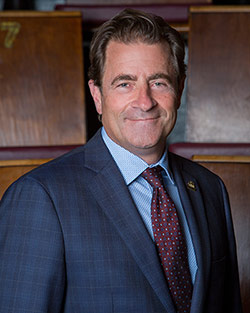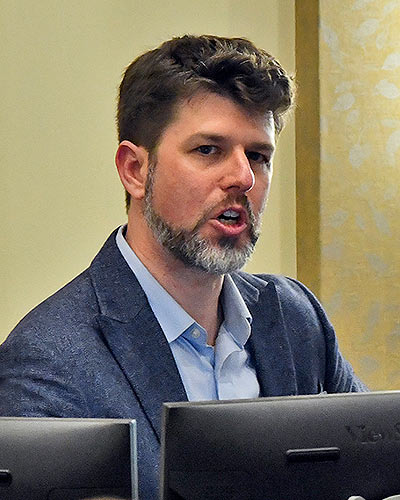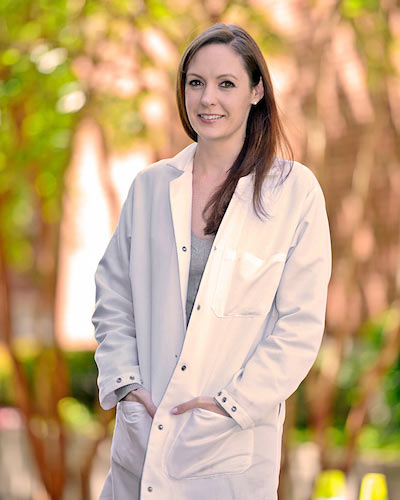May 23, 2025 | Jon Kelvey

As the U.S. battles a fourth wave of a drug overdose public health crisis that is claiming 300 lives a day, the University of Maryland School of Medicine’s Kahlert Institute for Addiction Medicine is marking its two-year anniversary with remarkable progress in its mission to develop life-saving treatments and novel approaches to discovery.
 Research remains at the forefront of its mission: Kahlert Institute Associate Director Sarah Kattakuzhy, MD, is set to launch an innovative new clinical trial to test whether a repurposed medication — the GLP-1 agonist Ozempic used to treat diabetes and obesity — is effective against this fourth wave of the opioid crisis, which involves using cocaine along with opioids. Her research, funded by the National Institutes of Health, will aim to see whether GLP-1 agonists work to reduce cravings that lead to relapses in people with cocaine use disorder. Other faculty members are employing new technologies like single nucleus RNA sequencing to learn more about the genetic underpinnings of substance use disorders in order to develop new targets for novel therapies.
Research remains at the forefront of its mission: Kahlert Institute Associate Director Sarah Kattakuzhy, MD, is set to launch an innovative new clinical trial to test whether a repurposed medication — the GLP-1 agonist Ozempic used to treat diabetes and obesity — is effective against this fourth wave of the opioid crisis, which involves using cocaine along with opioids. Her research, funded by the National Institutes of Health, will aim to see whether GLP-1 agonists work to reduce cravings that lead to relapses in people with cocaine use disorder. Other faculty members are employing new technologies like single nucleus RNA sequencing to learn more about the genetic underpinnings of substance use disorders in order to develop new targets for novel therapies.
After launching in May 2023, the Kahlert Institute has made important strides, hiring its inaugural Director Kelly Dunn, PhD, holding its first annual research symposium, and submitting 19 research grant applications totaling $18 million. Initially funded with two $10 million investments from the Kahlert Foundation and the University of Maryland, Baltimore (UMB), as well as an additional $5 million from UMSOM to build out the Institute's space in the state-of-the-art HSF III building, the Institute has garnered important recognition both locally and nationally. It also established the B-Core Program with $10 million in Baltimore City opioid restitution funds, was accepted into a prestigious National Institute on Drug Abuse multi-site randomized trial program, and hired four top faculty recruits.
 Kahlert Institute researchers also created the Matthew Osborne Postdoctoral Fellowship program for early career addiction researchers with funding gifted by the Osborne family. They will be holding the second annual research symposium on May 28 featuring Gary Aston-Jones, PhD, Director of the Cognitive Neuroscience Center and the Neuroscience Institute at the Medical University of South Carolina, and Anna Konova, PhD, Director of the Addiction and Decision Neuroscience Laboratory at Rutgers University, as keynote speakers.
Kahlert Institute researchers also created the Matthew Osborne Postdoctoral Fellowship program for early career addiction researchers with funding gifted by the Osborne family. They will be holding the second annual research symposium on May 28 featuring Gary Aston-Jones, PhD, Director of the Cognitive Neuroscience Center and the Neuroscience Institute at the Medical University of South Carolina, and Anna Konova, PhD, Director of the Addiction and Decision Neuroscience Laboratory at Rutgers University, as keynote speakers.
Under the new leadership Dr. Dunn, who UMSOM Dean Mark T. Gladwin, MD, appointed as the inaugural Director last November, the Kahlert Institute is striving to reverse the opioid crisis on all fronts from basic research to clinical trials to community programs that fight the stigma associated with drug addiction.
“A staggering 85 percent of people with opioid use disorder, more than five million individuals across the U.S., still go untreated, which puts them at grave risk of dying prematurely from their addiction,” said UMSOM Dean Mark T. Gladwin, MD, who is also Vice President for Medical Affairs, University of Maryland, Baltimore, and the John Z. and Akiko K. Bowers Distinguished Professor. “Kahlert Institute researchers are probing everything from the cellular responses to stimulant drugs to methods of reducing social stigma in an effort to determine the root causes of addiction, biologically and sociologically, and to make progress towards overcoming the generational challenge of addiction.”

Building Toward Clinical Trials in Addiction Medicine
The Kahlert Institute is currently focused on establishing operations and lab space on the fifth floor of the UMSOM HSF III building, aiming to be fully operational by the end of 2025. The space includes state-of-the-art wet and dry labs focused on accelerating fundamental and translational science alongside fully integrated space for clinical research and education.
"We're also looking to support out-of-the-box innovative preclinical research ideas," Dr. Dunn said, like those of Summer Thompson, PhD, who joined the institute as an Assistant Professor in Psychiatry from the Yale School of Medicine. Dr. Thompson is exploring what, if any, role the gut microbiome plays in determining whether someone is more likely to use drugs. “We are among the first to investigate the connection between addiction and the gastrointestinal microbiome. Dr. Thompson is really a trailblazer,” Dr. Dunn said.
In her role as director, Dr. Dunn, who is also a UMSOM Professor of Psychiatry and Neurobiology, envisions the Kahlert Institute as a bridge between preclinical, basic science research and clinical research and care at UMSOM, “translating the preclinical literature into first-in-human laboratory studies and Phase I through III clinical trials.”
To build the capacity to conduct such studies, the institute hired Joseph Harrison, MS, as Director of Clinical Research Operations and Compliance in March, who brings more than 20 years of experience running clinical trials at Johns Hopkins School of Medicine. The Kahlert Institute also recently joined both the Appalachian node of the National Institute on Drug Abuse’s Clinical Trials Network (CTN), which will provide important infrastructure and the opportunity for research collaboration.
A New Roadmap for Treating Addiction
In a recent op-ed published in MedPage Today, Dr. Dunn laid out her strategic vision for the Kahlert Institute, aiming to both develop more treatments for opioid use disorder and reduce stigma surrounding addiction. She drew a sharp contrast between depression, which has 30 approved medications, and opioid use disorder, which has just four approved treatments. She underscored the need for addiction medicine researchers to fill in gaps on the biology of addiction in order to develop more treatment options.
To help reduce stigma, Dr. Dunn said the Kahlert Institute will work with local and national leaders, including former University of Maryland Basketball star Ernie Graham, to create messaging campaigns similar to celebrity campaigns that have raised awareness about depression.
As part of its mission to develop and test innovative new treatments, new faculty at the Kahlert Institute are developing the first-ever clinical outcome assessment for craving in substance use disorders that the FDA could eventually use as a metric to measure the efficacy of new addiction treatments submitted to the agency for approval. ”We are excited to hire Cecilia Bergeria, PhD, to do this innovative work. She will join us from Johns Hopkins University, in September as the Matthew Osborne Lead Addiction Researcher,” said Dr. Dunn. Kahlert Institute researchers also expect to receive funding from the National Institute on Drug Abuse to develop the first consensus measure of symptoms of opioid withdrawal, another tool that will be useful for approving new treatments.
Current treatments for substance use utilize only a few mechanistic pathways, according to Dr. Dunn, and another goal of Kahlert Institute research is to better characterize the neurobiology of addiction, helping identify new therapeutic targets. Peter Manza, PhD, who recently joined the institute from the National Institute on Alcohol Abuse and Alcoholism (NIAAA), has been investigating how Ritalin works in the brain. He recently published a study that found the ratio of subtypes of receptors for the neurotransmitter dopamine in a healthy person’s brain determines how well Ritalin works for them. The finding will help steer future research into people who misuse stimulant drugs like Ritalin.
One additional component of Dr. Dunn’s vision for the near future: Developing a community advisory board that will meet regularly to help Kahlert Institute faculty better understand those they serve.
“What do patients actually want to achieve in treatment, and how can we use our knowledge of neurobiology and clinical trials to identify what those treatments may be?” Dr. Dunn said. “These questions are just as important to answer as the ones investigating the biological mechanisms behind addiction.”
Contact
Office of Public Affairs
655 West Baltimore Street
Bressler Research Building 14-002
Baltimore, Maryland 21201-1559
Contact Media Relations
(410) 706-5260
Related stories

Wednesday, August 07, 2024
Nationally Recognized Behavioral Scientist Dr. Kelly Dunn Named Director of the Kahlert Institute for Addiction Medicine at the University of Maryland School of Medicine
UMSOM Dean Mark T. Gladwin, MD, announced today the appointment of Kelly Dunn, PhD, MBA, one of the nation’s leading researchers on opioid use disorder, as the inaugural Director of the School’s Kahlert Institute for Addiction Medicine. Dr. Dunn is currently a Professor of Psychiatry and Behavioral Sciences at Johns Hopkins School of Medicine with a joint appointment in Health Policy and Management at the Johns Hopkins University School of Public Health. Dr. Dunn has been the Principal Investigator on projects totaling more than $21 million in awards from the National Institutes of Health. She has authored more than 130 peer-reviewed publications in the area of substance use and opioid use disorder.

Monday, May 20, 2024
UMSOM’s Kahlert Institute for Addiction Medicine Hosts Inaugural Research Symposium
The University of Maryland School of Medicine (UMSOM) hosted the Kahlert Institute for Addiction Medicine’s Inaugural Research Symposium on Monday, May 6 at the school’s Baltimore campus.

Tuesday, July 06, 2021
UM School of Medicine Researchers Receive NIH Avant-Garde Award for Out-Of-Box Concept to Cure HIV and Treat Co-Existing Addiction
Linda Chang, MD, MS, Professor of Diagnostic Radiology & Nuclear Medicine at the University of Maryland School of Medicine (UMSOM), received the National Institute on Drug Abuse (NIDA) 2021 Avant-Garde Award (DP1) for HIV/AIDS and Substance Use Disorder Research — a National Institutes of Health (NIH) Director’s Pioneer Award. This prestigious award supports researchers with exceptional creativity, who propose high-impact research with the potential to be transformative to the field.

Monday, September 11, 2017
UM SOM Researcher Discovers New Potential Pathway for Treating Addiction
Breakthrough Research Recognized with 2017 Grand Prize from Science Magazine

Friday, April 29, 2016
Baltimore City Health Commissioner Speaks at University of Maryland School of Medicine Addiction Conference
Baltimore City Health Commissioner Leana Wen and other experts recently addressed ways to decrease the epidemic of opioid overdose deaths at a conference on mental health and addiction.
